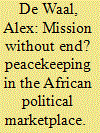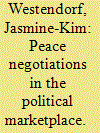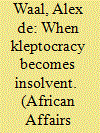| Srl | Item |
| 1 |
ID:
086943


|
|
|
|
|
| Publication |
2009.
|
| Summary/Abstract |
Since the mid-1990s the UN, in tandem with major western powers, has embarked upon an ambitious effort of peace support operations in Africa. The results of what we may call the 'Annan experiment' are not yet in. But there are good reasons to fear that, in many African countries, such peace operations have defend normative outcomes that are beyond realistic expectation, so that they can never hope to 'succeed'. This article examines the political and economic functioning of fragile African states using the lens of a 'political marketplace' in which local elites seek to obtain the highest reward for their loyalty, over short time horizons, within patrimonial systems. In such systems, political institutions are incapable of managing confect, which means that standard peacemaking efforts and peacekeeping operations do not align with domestic possibilities for settlement. To the contrary, external engagements can so distort domestic political markets that they obstruct national political bargaining and result in an open-ended commitment to peacekeeping in countries such as the Democratic Republic of Congo and Sudan.
|
|
|
|
|
|
|
|
|
|
|
|
|
|
|
|
| 2 |
ID:
160948


|
|
|
|
|
| Summary/Abstract |
This article investigates the implications of women’s exclusion for the nature and durability of peace processes, and whether factors that undermine peace consolidation post-settlement might be prevented through more inclusive peacemaking. It examines the Sudan-South Sudan peace process that produced the 2005 Comprehensive Peace Agreement, the roles women played in peacemaking and their exclusion from official negotiations, and the sources of insecurity post-CPA. South Sudan’s peace process shows that the exclusion of women can be understood as a canary in a coal mine: a highly visible marker of the broader exclusivity of such processes, and the complex dynamics of elite capture in war and peace processes. Women’s exclusion was the product of the region’s political marketplace, in which power and authority is secured by elites through violence and bargaining, to the exclusion of other groups. By understanding exclusion as a deliberate strategic tactic that extends from war into peacetime, I argue that the exclusion of women is not the reason why peace processes fail in and of itself, but rather the product of elite ownership of peace processes and the structure of many peace processes that facilitates and rewards such ownership, with serious consequences for the sustainability of peace post-settlement.
|
|
|
|
|
|
|
|
|
|
|
|
|
|
|
|
| 3 |
ID:
133102


|
|
|
|
|
| Publication |
2014.
|
| Summary/Abstract |
South Sudan obtained independence in July 2011 as a kleptocracy - a militarized, corrupt neo-patrimonial system of governance. By the time of independence, the South Sudanese "political marketplace" was so expensive that the country's comparatively copious revenue was consumed by the military-political patronage system, with almost nothing left for public services, development or institution building. The efforts of national technocrats and foreign donors produced bubbles of institutional integrity but the system as a whole was entirely resistant to reform. The January 2012 shutdown of oil production bankrupted the system. Even an experienced and talented political business manager would have struggled, and President Salva Kiir did not display the required skills. No sooner had shots been fired than the compact holding the SPLA together fell apart and civil war ensued. Drawing upon long-term observation of elite politics in South Sudan, this article explains both the roots of kleptocratic government and its dire consequences.
|
|
|
|
|
|
|
|
|
|
|
|
|
|
|
|